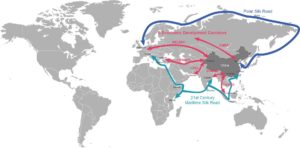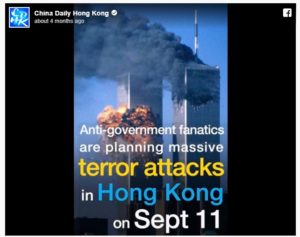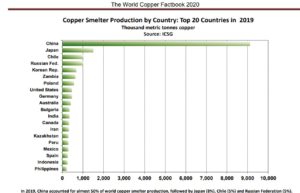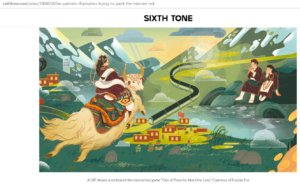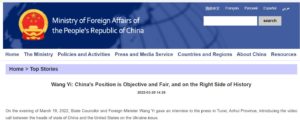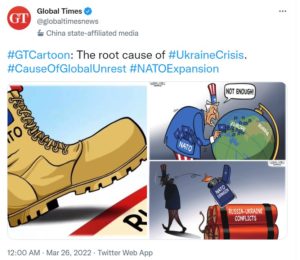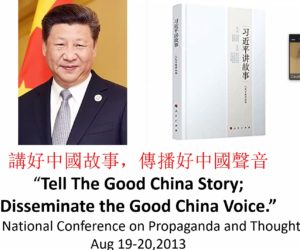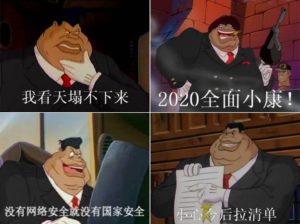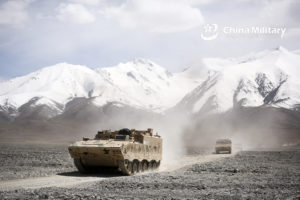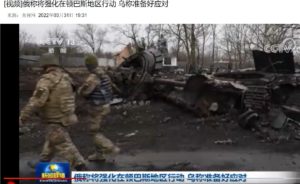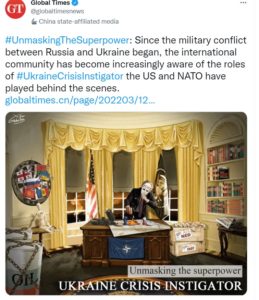A NEW ERA XI JINPING CANNOT IMAGINE
A blog on how Putin’s invasion of Ukraine changes the whole world, Tibet included
When Donald Trump blamed China for everything ailing the US, big business carried on as usual, sourcing everything from China, building factories in China, doing all they could to win over China’s new rich consumers to their brands. Tesla chose the moment of most intense confrontation to announce it would build a megafactory in China.
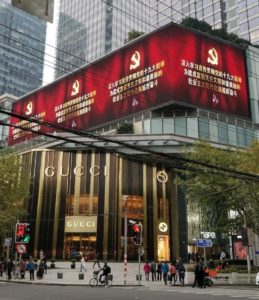
When Joe Biden took over the rivalry with China was systematised, in the name of maintaining a global rules-based order. Big business, which the world sees as American, but which sees itself as beyond national allegiances, carried on as usual.

China talked of the need for greater self-reliance, but also of maintaining and expanding the world’s most complete commodity, manufacturing and logistics chain. Global big business carried on as business as usual.
When pandemic hit, disrupting supply chains and “efficiency”, big business carried on as usual, dodging disruptions wherever possible. Loose talk suggesting the world now needs to “decouple” or “deglobalize” was dismissed as unrealistic, expensive, unnecessary.
When the pandemic became endemic, persistent, erupting over and over, further disrupting supply chains, talk of ending globalisation grew, but again was dismissed.

Now Russia has invaded Ukraine, disrupting further the commodity supply chain, and this increasingly looks like the last straw for a globalised, highly interdependent world economy in which China is the world’s factory. Now, big business is starting to think seriously that the system of global division of labor it relied on, is no longer reliable. For the first time in a long time there is much more talk of national self-reliance, the need for protectionist industry policy to revive manufacturing worldwide, even autarky.
Here is what Financial Times says: “The world of the past several decades has gained from low rates, low inflation and growing global ties under liberal-democratic hegemony. We think that world is on its way out, and put the key changes into four categories: geopolitical shifts, the rise of populism, the energy transition, and demographics. In geopolitics, borders are hardening. The US and China are pulling apart in fits and starts, especially where technology is concerned — with US restrictions on Huawei, and threats to revoke US listings of other Chinese tech firms matching China’s long standing limits on US tech giants operations in China.
“The US business lobby that once pushed for cordial relations with China has almost entirely switched its stance toward confrontation, notes former IMF China head Eswar Prasad. First drawn in by the country’s vast and increasingly rich population, firms began to realise that access to Chinese markets came with strings attached. As accusations of intellectual property theft and forced technology transfer flew, corporate America soured on China. US foreign direct investment in China peaked in 2008 at $21bn and has since fallen to $9bn as of 2020. Chinese FDI flows to the US have also stalled. American businesses in China report lost sales, consumer boycotts and suffocating uncertainty.”
Russia’s big mistake was to believe its’ own propaganda. Now China is captive to its propaganda that everything bad is the fault of the US.
China has sided with Russia, yielding to the widespread anti-American anger carefully cultivated by the propaganda machine. That makes CCP leaders feel good, short term. Yet China’s long term interest is in maintaining the global flow of raw materials into China, and the flow of manufactured goods out of China. Now it’s anger vs skilfulness, short vs long term. China prides itself on its ability to think long-term, yet, in reality is a prisoner of the short-term, the self-righteous nationalist anger it whipped up and is now constrained by.
Yet the hot-shots of capitalism, such as Black Rock’s Larry Fink, see a new pattern emerging, which Xi Jinping is failing to notice. Fink declares, Russia’s attack on Ukraine “has put an end to the globalisation we have experienced over the last three decades. We had already seen connectivity between nations, companies and even people strained by two years of the pandemic. It has left many communities and people feeling isolated and looking inward. I believe this has exacerbated the polarisation and extremist behaviour we are seeing across society today. What we are arguing is that geopolitical tension, populist fiscal policy, the energy transition, and an ageing world are all important, all coming to a head simultaneously, and are all discontinuous with the low rate, low inflation, high integration, hegemonically liberal-democratic world we have enjoyed since 1980s. That era does seem to be dying, even if we can’t be sure yet what era is being born.”
Some Chinese voices are now urging China to relearn long term thinking, below.
Tibetans may think they are onlookers, with no stake in these high dramas. Yet if decoupling continues, China will invest more on self-reliant sourcing of raw materials, and that means more intensive exploitation of Tibet. Copper, lithium, gas, oil, magnesium, molybdenum, solar and wind power to replace imported oil, all can be sourced from Tibet more intensively than now. China’s famous Tsingdao beer, exported to 60 countries, may have to turn to Tibetan barley, the staple of the Tibetan diet, if Ukraine is cut off. Potash to fertilise China’s farming fields, extracted from Tibetan salt lakes. What Tibet does for China is a long list, getting longer.
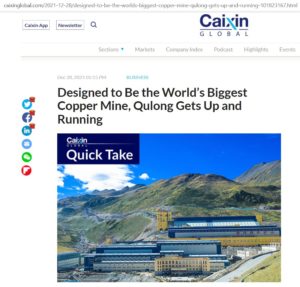
The rail line China is building from Xining to Chengdu is integral to China’s plan to shorten its vulnerable ocean routes for shipping Mideast oil to China, from 12000 kms down to only 2000 kms by sea, then by rail through Pakistan, Xinjiang and eastern Tibet, to provide oil to the whole southern half of China. Tibet is now part of a global economy, not by choice, and the future of globalisation impacts Tibet.
Now, here is a thoughtful, long term Chinese perspective:
https://www.noemamag.com/why-the-world-needs-china-to-be-pragmatic-again/
Why The World Needs China To Be Pragmatic Again
To pragmatists in Beijing, brokering peace in Ukraine presents a rare opportunity for China to repair its deteriorating relationship with the U.S. and Europe.
BY YUEN YUEN ANG MARCH 30, 2022
Yuen Yuen Ang is a professor of politics at the University of Michigan, Ann Arbor. In 2021, she was named by Apolitical as one of the 100 most influential academics in government. Ang is also the inaugural recipient of the American Political Science Association’s Theda Skocpol Prize for Emerging Scholars.
“Great nations must carry great responsibility” is a phrase frequently invoked by President Xi Jinping in his campaign to revive China’s past glory as a global superpower. On March 29, the Kremlin announced that it will scale back military attacks near Kyiv, though U.S. officials are skeptical whether this promise is sincere. Now is truly the time for Beijing to step forth and prove itself to be a responsible power. Beijing’s actions can advance the best-case scenario of a ceasefire — and prevent the worst-case scenario of a nuclear World War III.
Contrary to the popular impression of China as a monolith that thinks and acts in unison, we can discern at least two opposing strands of thought within China on how Beijing should respond to the crisis in Ukraine: anti-American and pragmatic. Currently, in both official statements and social media commentary amplified by the Chinese Communist Party (CCP), the anti-American lens dominates. Its logic is appealing in its simplicity: the enemy of my enemy — Moscow — is necessarily a friend, no matter the atrocities committed by this friend.
But not everyone in Beijing or China agrees with this official line.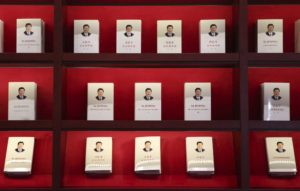 Pragmatists advance a different line of argument. What matters most for China, they argue, is its long-term growth, global standing and principles. From this perspective, rejecting Putin’s invasion and actively brokering peace in Ukraine presents a rare opportunity for China to repair its deteriorating relationship with the U.S. and Europe. This would help China secure favorable — or at least less hostile — conditions for its development, which rests on global integration, and it is also consistent with Beijing’s avowed principles of respecting national sovereignty.
Pragmatists advance a different line of argument. What matters most for China, they argue, is its long-term growth, global standing and principles. From this perspective, rejecting Putin’s invasion and actively brokering peace in Ukraine presents a rare opportunity for China to repair its deteriorating relationship with the U.S. and Europe. This would help China secure favorable — or at least less hostile — conditions for its development, which rests on global integration, and it is also consistent with Beijing’s avowed principles of respecting national sovereignty.
During the latter half of the 20th century, Deng Xiaoping’s abandonment of communist, anti-Western dogma in favor of pragmatism transformed China from an impoverished, isolated country into a superpower within one generation. To avoid the return of a Soviet-era-style Cold War and for global peace to reign, Beijing must once again embrace pragmatism over ideology.
The Enemy Of My Enemy
The Russian invasion of Ukraine came against the backdrop of an authoritarian turn within China, Xi’s growing ambitions to position China as a leader on the world stage and a climate of heightened U.S.-China hostilities. During the Winter Olympics, only weeks before the invasion began on Feb. 24, Xi and Putin — who share deep grievances against the U.S. and Western democracies — pledged a friendship with “no limits.”
Beijing abstained from voting at the United Nations General Assembly against the Russian invasion. At a UN Security Council meeting in March, Chinese representative Zhang Jun defended “the reasonable security concerns of all States,” which implies that Moscow’s concerns are as reasonable as Ukraine’s.
The position taken at the highest level is amplified across the government and in political commentaries that are allowed to circulate widely within China. One such opinion piece reads: “NATO has caused the whole Russian nation to feel extremely insecure.” “A new world order is being formed,” it concludes, and “the balance of geopolitics is once again tilting toward China.”
“Now is truly the time for Beijing to step forth and prove itself to be a responsible power.”
Similarly, on social media, one analysis estimates that about half of the posts on Weibo (China’s micro-blogging site) blame the U.S., NATO, Western aggression or Ukraine itself for the crisis in Ukraine. However, because dissenting voices are quickly censored, the posts that remain on social media may not represent public opinion. For example, one Chinese blogger gained followers after he posted videos shot from his apartment in Ukraine. “Why can only those voices cheering for bloodshed spread around?” he asked passionately. In another instance, Chinese netizens briefly flooded WeChat with criticisms of the official foreign policy. One post read: “Pro-Russia posts are always intact! Pro-Ukraine ones are often muffled!”
What explains Beijing’s tacit support for Russia? As Maria Repnikova and Wendy Zhou pointed out in The Atlantic, “China’s pro-Russia rhetoric is more rooted in anti-Western (and particularly anti-American) sentiment than in substantive support for Russia’s military operation or in any unwavering alliance.” More simply put, the enemy of my enemy is my friend. This logic is captured in a tweet by Liu Xin, a senior host at China’s state media agency CGTN, who tweeted shortly after Biden urged Xi to help end Russia’s aggression: “Can you help me fight your friend so that I can concentrate on fighting you later?”
China’s pretense of neutrality is impossible to maintain as Putin’s army continues to shell and kill civilians in Ukraine — in clear violation of China’s long-standing insistence on respecting territorial sovereignty.
Alternative Voices In China
The difference between democracies and autocracies is not that elites and citizens disagree intensely in the former, while everyone thinks the same in the latter. The difference is that in autocracies, debates are suppressed — thus we tend only to hear opinions consistent with the official position. Even then, some in China have tried to offer a pragmatic line of thinking.
One notable case is Hu Wei, the vice-chairman of the Public Policy Research Center of the Counselor’s Office of the State Council. His essay was published in Chinese on March 5, the day China’s national legislature opened its annual session, and an English translation was made public shortly before Chinese diplomat Yang Jiechi’s March 14 meeting with Biden national security adviser Jake Sullivan.
Mincing no words, Hu states that Putin’s military action “constitutes an irreversible mistake” and faces the devastating risk of escalation, potentially “triggering a world war or even a nuclear war.” In effect, Putin’s invasion has united NATO and restored U.S. leadership, triggering the danger of a new Iron Curtain falling not only along Russia’s borders, but between Western democracies on one side and Russia and China on the other. In this scenario, “China will become more isolated” and “encounter further containment,” he warned. Even those countries who do not wish to choose sides will have to do so.
“To avoid the return of a Soviet-era-style Cold War and for global peace to reign, Beijing must once again embrace pragmatism over ideology.”
China cannot afford to tie itself to and sink with Putin, Hu urged. Nor is neutrality an option because, in effect, it only displeases all sides. Instead, choosing “the mainstream position in the world” and brokering peace in Ukraine “will help build China’s international image and ease its relations with the U.S. and the West.” Doing so will “surely win widespread international praise for maintaining world peace” and “save [China] from isolation.”
A similar view is echoed in a New York Times editorial by Wang Huiyao, president of the Center for China and Globalization and an adviser to the Chinese government, which appeared on March 13. Appealing to China’s economic interests, Wang underscores the fact that in 2021, trade between China and Russia was less a tenth of China’s combined trade with the U.S. and European Union. Reviving an old Cold War divide, he cautioned, “is not good for China, which would prefer to maintain lucrative economic ties with the West and focus its resources on domestic development.” Not to forget, standing by Russia “undercuts one of China’s key values” — territorial integrity. Wang urges Beijing to play an active mediation role, and since Russia needs China, “there is no country better placed to do so than China.”
Pragmatic recommendations speak not only to a geopolitical crisis but also to the future of China’s domestic direction. Under Deng, economic and political liberalization went hand-in-hand with U.S.-China engagement. If China is isolated by the U.S. and its allies for its perceived support of Russian aggression, this will not only undermine a fundamental condition for China’s rise, it will likely accelerate China’s authoritarian, statist and nationalist turn at home. The fear of foreign threats in a Soviet-era style climate could only further silence dissent, fire up nationalism and pressure central planners to accelerate technological and military catch-up through top-down commands and state-owned behemoths. Nobody — neither China nor the U.S. — could benefit from such an outcome.
Should U.S.-China tensions degenerate into a Soviet-era-style Cold War, the effects will be felt around the world and by every person, even those who think they have nothing to do with geopolitics. As Joanna Chiu pointed out in this magazine, the anti-China climate in the past years has eliminated the space for nuance, whereas bombastic, simplistic narratives proliferate. Individuals who fear being perceived as pro-China “are pushed to be vehemently anti-China,” she adds, quoting Amy Chang, who has worked in policy and intelligence for the past decade. If the situation was already bad before 2022, imagine how much worse it would get if the U.S. perceives China and Russia as “the new axis of evil.” Every person will be forced to “choose sides.”
The Triumph And Erosion Of Pragmatism
The tug of war between pragmatism and dogma has a long history in Chinese politics. These two strands of thinking have always coexisted, and leaders have oscillated between the two extremes as power changed hands from Mao to Deng and, today, to Xi.
Under Mao, the Chinese economy was organized around communist ideology, which means that state ownership of production, top-down planning and strict egalitarianism were not means to the end of development — rather they were ends in themselves, even if the price for maintaining them was inefficiency and poverty. Drumming up fears of malicious Western intentions, the CCP justified closing China’s doors to the outside world. Through a personality cult, Mao turned himself into a God-like figure whose words could not be questioned. During the Cultural Revolution, Mao incited radical followers to attack the government and his rivals, throwing the nation into 10 years of mass violence.
When Mao died in 1976, Deng took over a broken, traumatized nation. His antidote to Mao’s dogma was a simple yet powerful phrase: “seek truth from facts.” China’s goal should be development — and success should be judged by whether people’s lives have improved in practice. Private capitalism and global integration, Deng argued, are two essential means to achieve development. Famously, he encapsulated this revolutionary argument in a folksy axiom: “It doesn’t matter whether the cat is black or white, as long as it catches mice.”
“Should U.S.-China tensions degenerate into a Soviet-era-style Cold War, the effects will be felt around the world.”
With pragmatism as a de facto national philosophy, Deng proceeded to advance three critical reforms that laid the foundation for China’s rise. First, he ensured political stability by replacing one-man dictatorship with collective leadership and term limits. Second, he opened markets and encouraged private entrepreneurship. Third, by demonstrating his commitment to liberalization, Deng won the trust of American leaders, who normalized relations with the People’s Republic of China in 1979 and welcomed China into the global capitalist economy. Importantly, Chinese domestic reforms went hand-in-hand with its engagement with the U.S.
Fast forward to 2013. Upon becoming the top leader, Xi progressively dismantled all four pillars of Deng’s leadership. Reviving elements of a personality cult, he enshrined “Xi Jinping thought” in the Constitution and required young children to learn it in school. His campaign against corruption required not only honest officials but also correct political thinking and strict adherence to the party line. In 2013, the central party office issued a document criticizing Western ideas such as pro-market liberalism and universal human rights. “Western forces hostile to China,” it warned, “are constantly infiltrating the ideological sphere.”
In the political realm, Xi centralized personal power and removed term limits, paving the way for his lifelong presidency. In the economy, Xi has expanded the state sector at the expense of the private sector. And in foreign policy, Xi replaced Deng’s modest maxim of “keeping a low profile” with ambitions to lead. In 2013, he launched the Belt and Road Initiative, a massive project that financed and built infrastructure around the world. In 2021, Deng’s era truly came to an end when the CCP announced a historic resolution that diluted Deng’s contributions and hailed Xi as “the helmsman,” a title once reserved for Mao.
Engagement Sours
When China under Xi coincided with the U.S. under Trump in 2016, U.S.-China relations spiraled downward from engagement to competition and even hostility. Like a bitter couple, both sides blame the other — but neither acknowledges their role in the breakdown of relations.
Beijing has good reasons to feel aggrieved about the U.S. The Trump administration adopted an openly hawkish policy toward China. 0The Biden administration takes a more rational approach than Trump’s wild tweets, but it has framed U.S.-China competition as a moral battle between “democracy” and “autocracy” — which, from the CCP’s point of view, means the two sides are implacably opposed. As Wang Jisi writes in Foreign Affairs, “In Chinese eyes, the most significant threat to China’s sovereignty and national security has long been U.S. interference in its internal affairs aimed at changing the country’s political system and undermining the CCP.” This perception extends beyond Zhongnanhai to the public sphere. “Most Chinese observers now believe that the United States is driven by fear and envy to contain China in every possible way,” he adds.
“How China chooses to act on the war in Ukraine could either reset U.S.-China relations in a positive direction or set the two nations on an accelerated collision course.”
But while Beijing under Xi justifiably feels threatened, it makes no mention of its own role in courting this situation. Deng’s guiding principle in foreign policy is tao guang yang hui, which means “hiding your capabilities.” These days, it is frequently translated as “biding your time” and taken out of context to bolster the claim that Deng plotted to take over the U.S. when China is strong enough. In Deng’s own words, tao guang yang hui means “lower your head and work hard, avoid showing off, avoiding making yourself a target, avoiding attracting fire to yourself.” His warning to his successors was firm and clear: “China must not lead. This is a fundamental national policy. We cannot afford to lead. It will certainly bring no benefit.”
Xi’s administration, however, ignored Deng’s advice. Xi announced to the Politburo that China must no longer “be a bystander” of the international system, but rather “a leader.” To Xi and his loyalists, “The East is rising and the West is declining.”
But this assessment underestimated the tenacious structural power of the U.S., even amid a democratic crisis. The concessions that Beijing made during the trade war were themselves evidence of its initial hubris. As Deng rightly predicted, Xi’s ambitious foreign policy and claims to global leadership raised alarm bells in Washington. Xi’s authoritarian and statist turn at home only worsened perceptions. When Washington responded with overt hostility, the CCP took it as confirmation of their long-standing suspicions of Western imperialism.
Breaking this vicious cycle of mutual suspicion — where the U.S. accuses China of plotting to overtake it, while China is sure that the U.S. wants to stop its rise — seems nearly impossible, except during an extraordinary crisis. How China chooses to act on the war in Ukraine could either reset U.S.-China relations in a positive direction or set the two nations on an accelerated collision course. In the latter scenario, no nation will win; everyone will lose.
Pragmatism And Empathy
China’s rise under Deng Xiaoping is not a validation of the strengths of authoritarianism over democracy — rather, it represents the triumph of pragmatism. Pragmatists value peace and prosperity as the ends and to do whatever is necessary to achieve them, even if it entails breaking ties with friends and working with rivals. To be ideological means to regard opposing enemies as an end, even if fighting comes at the price of peace and prosperity.
To turn the current dangerous situation around, Beijing should play the part of a constructive peacemaker not just in words, but in action. Amplifying pro-Russian, anti-Western narratives will only further inflame nationalism and tie the hands of the leadership. Even if Moscow voluntarily retreats from Ukraine, it doesn’t mean that China’s dilemma is over, for the U.S. and its allies will remember China as having tacitly supported this attack and remain adversarial for the long term. For China, the moment to positively change how the world sees it is now.
“Saving the world calls for pragmatism in Beijing and empathy in Washington.”
Judging from the views that are amplified and removed, however, the Chinese leadership has so far sidelined the advice of the pragmatists.
Saving the world calls for pragmatism in Beijing and empathy in Washington.
Yuen Yuen Ang is a professor of politics at the University of Michigan, Ann Arbor. In 2021, she was named by Apolitical as one of the 100 most influential academics in government.
